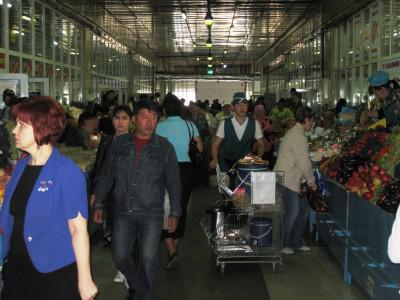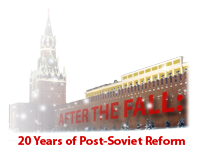
Markets have taken off faster than democracy in the former Soviet Union. (Photo: Staff)
More than 20 years after the fall of the Soviet Union, while the economic trends have seemingly been improving across the board, the democratic space has been persistently narrowing and huge challenges remain to establishing institutions that foster market-based democratic change. Democracy eludes this region. However, December 2011, the month that marks the 20-year anniversary of the fall of the USSR, may lay cornerstones for new trends and the foundation for new hopes.
Outside the Baltic countries (Estonia, Latvia and Lithuania), which are now members of the European Union, indicators measuring progress across the region in such crucial areas as media freedom (particularly Azerbaijan and Russia), including the internet, political competitiveness, rule of law, property rights, business freedom, and other basic freedoms have shown weak improvement, if not stagnation or outright decline, over recent years. Only Moldova has demonstrated a slight overall improvement in economic freedom in 2011. Freedom House rates seven of the countries that were once part of the Soviet Union as “Not Free” and five as “Partly Free.” None are rated as “Free.”

Consistently with the ratings above, the Economist Intelligence Unit’s Democracy Index 2011 released this month, shows that countries in the Commonwealth of Independent States (CIS) have been backsliding over the last several years, and according tot his publication, authoritarian trends have become entrenched. This index rates 165 countries in areas such as electoral processes, functioning of government, political participation, political culture and civil liberties. Moldova had the highest democracy rating in the CIS, and is alone in the category of “Flawed Democracies.” Ukraine, Georgia, Kyrgyzstan and Armenia (in this order) ranked as “Hybrid Regimes.” The other countries of the former Soviet Union, namely Russia, Kazakhstan, Belarus, Azerbaijan, Tajikistan, Uzbekistan and Turkmenistan, are in the “Authoritarian Regimes” category, with only Chad and North Korea scoring below Turkmenistan and Uzbekistan. Sadly, none of these countries place in the category “Full Democracies.”
Despite relatively high GDP growth reflected through official statistics in many CIS countries, unemployment, informality in business practices, elite cronyism, and debilitating corruption plague the region. Many young, educated adults leave to find jobs and start businesses elsewhere in the world. Capital flight is at its record high. Capital flight from Russia, for example, has been reported to soar year, after year after year, with net capital outflows of $55.6 billion over the past eight months. Ikea, among several other Western businesses, has closed its doors in Russia after complaining of corruption and a difficult business climate. Of all 12 countries, only Georgia makes it into the top 50 in the Forbes list of best countries to do business.
CIPE’s programs across the region, from Moldova to Kyrgyzstan to Georgia to Russia, have supported the independent pro-democracy voices of the entrepreneurship community to lead in economic and political reform. CIPE has worked closely with business associations of small- and medium-size businesses across Eurasia to address key problems that prevent a market economy and a democracy from taking root. CIPE and its partners have worked to lower the administrative barriers to entrepreneurship, reduce corruption, improve understanding of the true nature of market-based economy and political democracy, and increase appreciation for entrepreneurship.
By working with coalitions of likeminded pro-reform thought leaders to help foster entrepreneurial development, CIPE’s partners in the region have helped to strengthen the united voice of business through grassroots advocacy. These programs have brought about successes, often beyond expectations, in the improvement of understanding of these important principles and unprecedented support for market democratic values.
CIPE has also worked with economic journalists and editors of media outlets to help them understand basic economic concepts so that they can report more responsibly and accurately on business-related issues, and by doing so, help increase public understanding of these concepts as well. To help prepare the business community for a constructive public-private dialogue, CIPE has worked with business associations, independent analytical centers and think tanks, as well as other NGOs to develop a long-term vision for economic and democratic reform. Programs such as these are small steps, but they help garner support for long-term sustainable reform.
The history of the CIS countries has yet to be written. On one hand there is talk of bringing the former Soviet countries back into a Eurasian Union, building on the current Customs Union between Russia, Belarus and Kazakhstan. Russia’s admission into the WTO this month will play a significant role in its relationship with its neighbors, potential Eurasian Union members. However, this month has also witnessed unprecedented anti-government protests erupt in Russia and Kazakhstan. Apathy and indifference may give way to civil society’s demand for transparency, accountability, and the rule of law. These are essential pillars of a democracy and may yet plant roots in the former Soviet Union.
This post concludes our series on the 20th anniversary of the breakup of the Soviet Union. Links to the rest of the posts in the series can be found here.

